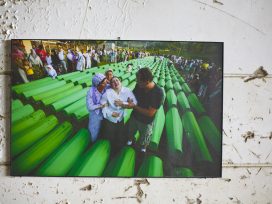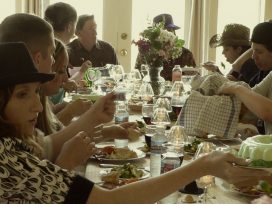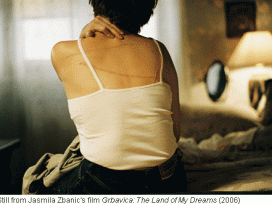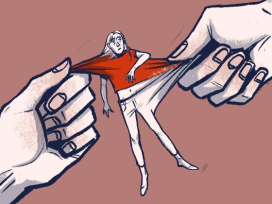The stakes of feminism
How Slavenka Drakulić made space for women’s issues in Yugoslavia
From introducing feminist literature on the pages of a semi-pornographic magazine to challenging the self-image of the socialist state of Yugoslavia: journalist and novelist Slavenka Drakulić has broken ground in many fields in her native tongue even before rising to international renown.
A new edition of Slavenka Drakulić’s collected essays offers a window on the lives of feminists in socialist Yugoslavia, the dangers they faced during the 1990s war and the issues challenging women in the aftermath of conflict.
At the beginning, if I wrote down the word feminism, editors crossed it out. That doesn’t happen nowadays.
Slavenka Drakulić writes this in the closing essay of her first book, The Mortal Sins of Feminism1, originally published in 1984. A collection of her writings from previous years, the first piece dates back to 1979. A lot had happened to Drakulić, and to feminism in Yugoslavia, in the five years between the first essay and the publication of the book. A new feminist language had found its niche in the Yugoslav public space, thanks to the courage, creativity and relentlessness of a group of women, and some men. Slavenka Drakulić was at the forefront of new Yugoslav feminism from its beginnings.
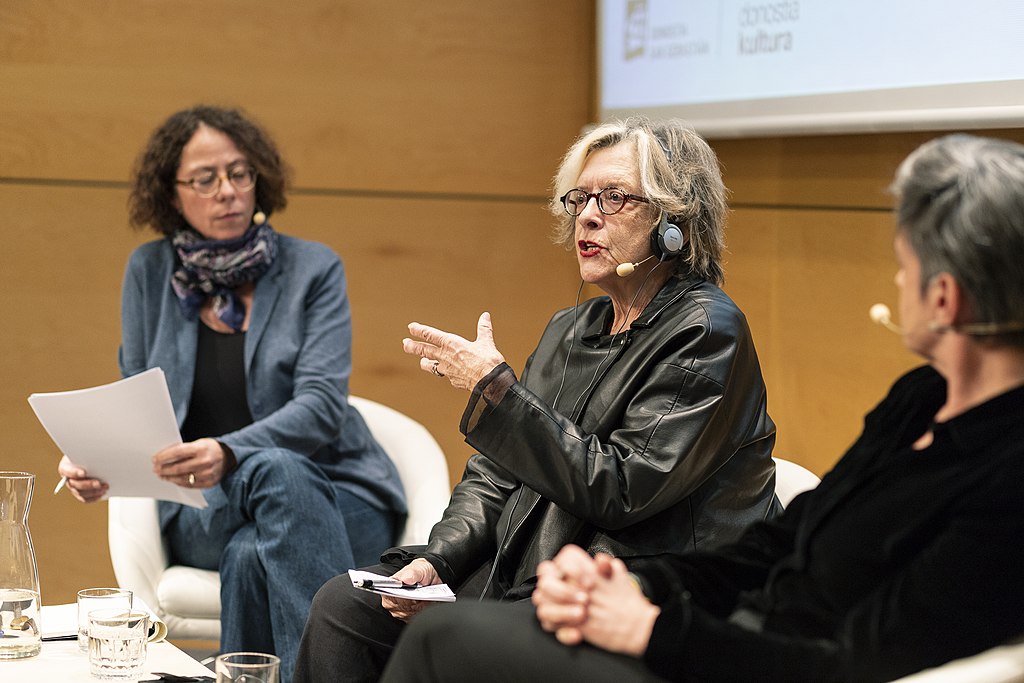
Slavenka Drakulić (in the middle). Photo by Josu De la Calle / DONOSTIA KULTURA, CC BY-SA 2.0, via Wikimedia Commons.
Making space
The story of feminism in Yugoslavia and Drakulić herself, in the 1970s and 1980s, is the story of women who were fearless, because, as Drakulić’s contemporary and fellow feminist, Dunja Blažević put it: ‘That was the way, you were not afraid’2. What one had to fear in socialist Yugoslavia in 1978, 1979 or 1984 is subject to historical debate nowadays.
However, a feminist certainly found herself under attack from many directions: from a new generation of men in important intellectual circles and newspapers, as well as from the Conference for the Social Activity of Women3 (the official women’s organization of the Yugoslav League of Communists). Their antifeminism took different shapes and forms, and was not allowed to rest given the witty and uncompromising critique of patriarchy that Drakulić and her fellow feminists voiced in newspapers, women’s magazines, academic publications, novels and artworks.
The Mortal Sins of Feminism contains the most important ideas for which Slavenka Drakulić is known: her critique of patriarchy, as well as her brave and unforgiving stance against sexism, hypocrisy, violence against women and ignorance. Her essays are as relevant today, as they were when they first appeared, so it is particularly appropriate that her first book was republished last year by the Fraktura Publishing House, in an extended Croatian edition.
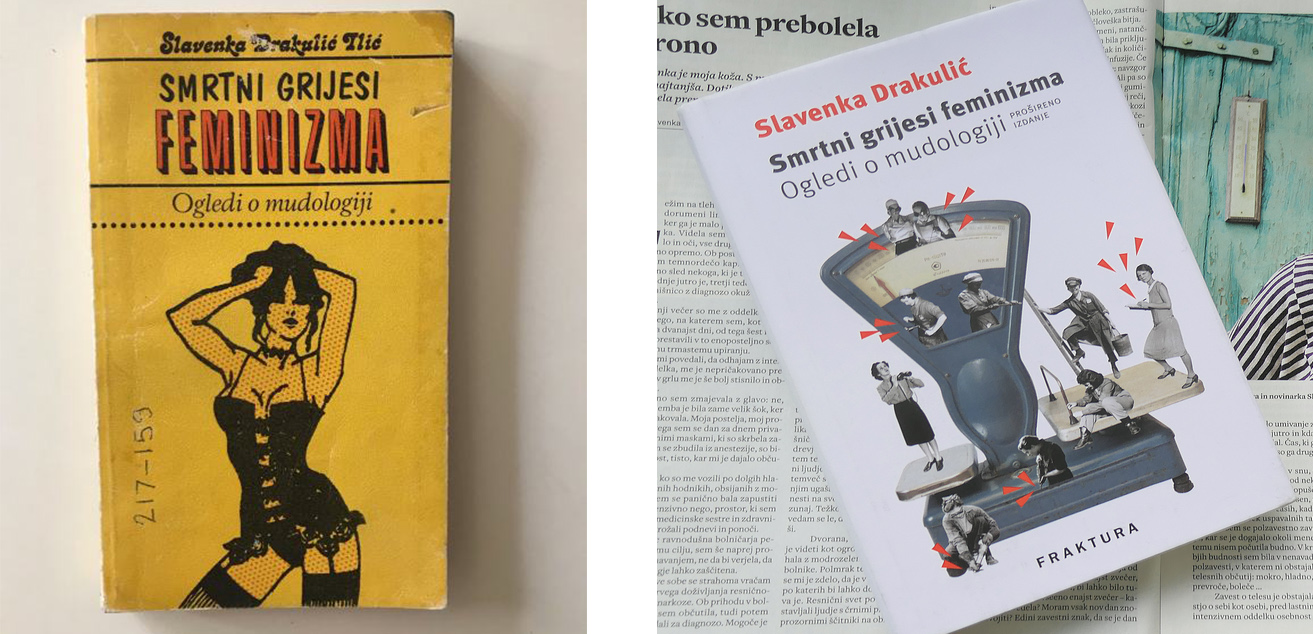
Covers of Smrtni grijesi feminizma by Slavenka Drakulić Left photo via njuskalo.hr, right via radiostudent.si..
For Drakulić, the possibilities presented by feminist writing expanded dramatically when the feminist group ‘Woman and Society’4 began its work. This introduced an organized form of feminist dissent and critique in Yugoslavia. The first feminist articles about feminism appeared as early as 1972, and the feminist movement gained an irrevocably steady presence in Yugoslavia with the 1978 conference in Belgrade entitled ‘Drug-ca žena / Comrade-ess Woman: The Woman Question – A New Approach?’5
After this event, no critique from macho men or hardliner party representatives (male or female) could erase feminism from the public sphere. For local feminists, this meant encouragement and reassurance: after the conference they sensed they could become vocal. Women in the group found more ways to talk to each other and rethink their own lives.
Feminists from near and far came to Belgrade to talk about women’s rights and women’s lives, Slavenka Drakulić among them. Soon after, the feminist section of the Society of Sociology6 was founded in Zagreb. Drakulić was an important member of the group, whose feminism became inspirational for many others.
Raising children and raising hell
The feminism of Drakulić and her fellow feminists was very largely about the personal being political. The short text ‘Instead of a Biography’7, which concludes her collected essays in The Mortal Sins of Feminism, is a statement about the personal, the everyday, the domestic being political – essentially, about what today we call care work and unpaid labour.
Drakulić writes:
While my husband and our friends were studying, and pursuing revolutionary goals, I was raising a child’8
This was an everyday experience shared by women in progressive political groups across the globe, especially in the post-1968 era. Ideas of revolution, equality, human rights were gaining new meanings and new significance.
There was a huge promise of a more just society, but male revolutionaries conveniently forgot about some burning issues – such as who deals with the dirty laundry. It was no different in socialist Yugoslavia, or anywhere else in the socialist bloc, despite the heralded success of women’s emancipation in these countries.
The new generation of women, whose mothers had often fought in the partisan army during WWII, witnessed the re-enactment of traditional gender roles not only by their parents but by their own generation as well. Sexism, violence against women, the uneven distribution of housework, the poor representation of women in politics, workplace bias prevailed, even after new socialist laws were introduced.
The new Yugoslav feminists, we can safely say, spoke for all women in communist East Central Europe, when they pointed to the shortcomings of the state socialist women’s emancipation project, as well as the machismo of various countercultural and dissenting groups within these regimes.

Partisan foremothers: an organizer of WWII resistance, Rada Vranješević speaking at the State Anti-fascist Council for the National Liberation of Bosnia and Herzegovina in 1943. Public domain, via Wikimedia Commons.
The essays in The Mortal Sins of Feminism also tell the story of feminism in Yugoslavia at the time. After the first ‘kitchen table’ discussions, the ‘Drug-ca žena Drug-ca žena’ conference was followed by many smaller events organized by the newly founded feminist group ‘Woman and Society’9, and by a number of publications. Slavenka Drakulić’s writing was a crucial part of this new, vivid feminist scene.
Reaching a broader public was a vital step, which had been preceded by more academic publications. However, we should not downplay the role of feminist academic work. It addressed a narrower audience, but the issues on its agenda were important. There were feminist investigations into the realities of women’s lives in sociology and social theory10; attempts to recover women’s history and the story of feminism in former Yugoslavia11; fascinating approaches to feminist philosophy12 and impressive efforts to reinterpret the artistic and literary canon.13
Art and literary works with a feminist angle were created by Irena Vrkljan, Sanja Iveković, Dubravka Ugrešić – to mention but a few names – as well as, most relevantly for this article, Drakulić herself. Her first two novels, Holograms of Fear14 (1987) and Marble Skin15(1988) examined women’s experiences of oppression and freedom. Feminism was also entering an even larger arena: it was finding its niche in the popular press, which was, of course, galling for those who opposed feminism, but groundbreaking for women whose lives it changed.
Selling feminism but refusing to sell out
Through the pages of women’s magazines such as Bazar and Svijet, and the political bi-weekly magazine Start, feminism could reach a broader Yugoslav audience. Slavenka Drakulić and Vesna Kesić were two feminist journalists who published regularly in Start, and many of the essays in Drakulić’s book originally appeared there.
Readers who remember the magazine, as well as those who will google it on their phones as they read this text, may be puzzled by the relationship between feminism and the Playboy-style images (which today, we would call pornographic) on the cover, as well as the inside pages of the magazine. When asked, Drakulić and Kesić both emphasised the high level quality journalism, intellectual complexity, wide circulation and, consequently, broad readership of Start.

Vesna Kesić wrote for Start with Drakulić. Photo via documenta.hr
While it is easy to criticise in retrospect or from the outside, writing for Start meant reaching hundreds of thousands of readers with feminist ideas that could be presented in a complex and subtle manner, something many feminist authors long for even today. Quite a few of these articles appear in The Mortal Sins of Feminism.
While it was not easy to be a feminist amidst sexist male authors, both women stood their ground. It was mostly through the pages of Start that Drakulić introduced the names of important feminist thinkers into the Yugoslav public sphere. Gloria Steinem, Élisabeth Badinter, Erica Jong and Shere Hite, as well as Susan Brownmiller and Simone de Beauvoir were mentioned with the utmost ease, conveying a sense that ‘of course’ these are intellectuals one just needs to know about.
The new antifeminist backlash that Drakulić’s feminism, and that of others, evoked is what she calls mudologija in these essays. A parallel term from around the same time is phallogocentrism, a creation of French feminist theory. Mudologija and phallogocentrism target a similar phenomenon. Coined from the words muda (testicles) and logos (word, law), the concept of mudologija focuses on the power dynamic between language and the male oppression of women.
Mudologija has a long history, writes Drakulić – it is probably at least as long as women’s struggle for equality. However, it had its revival with the appearance of new Yugoslav feminism, which became its new target – and a more than worthy opponent. Drakulić pokes fun at their efforts, pointing out the pettiness and hypocrisy, as well as the totalitarian tendencies in the arguments of the mudolozi.
Writing about the phenomenon, Drakulić gives a to-the-point account of the backlash feminists had to grapple with in the 1980s. She locates the smart use of mass media as one of the specificities of this new form of mudologija, compared to the way it existed a hundred years earlier. Thus, it was all the smarter for feminists to do the same thing and start writing for the same medium: in the Yugoslav case, this meant contributing to Start.
Clashing with the party line
Drakulić not only refutes and ridicules the efforts of the mudolozi: she also resists the critique of feminism coming from the Yugoslav League of Communists and the Conference for the Social Activity of Women. This is where the title of this volume comes from: the ‘mortal sins’ of feminism are those which come up in accusations levelled by these two organizations.
This is the other dominant form of anti-feminism of the time: the accusation that feminism committed ‘mortal sins’ against the self-managing socialist system. These accusations are based on stereotypes and lack of information. Slavenka Drakulić refutes all of them, with precision, and even with humour.
Most importantly, she points out the absurdity of talking about class and gender as mutually exclusive terms, and the absurdity of presenting Marxism and feminism as ideologies opposed to one another: this is a ‘false dilemma’. A stance that targets class oppression, and politics that focuses on women’s equality, are not mutually exclusive.
However, the focus on class does not put crucial issues on the table: we need feminism to make certain topics a subject of political debate. The official politics of ‘women’s issues’ did not talk about prostitution, rape, domestic violence, unpaid housework or sexism in education. Yet these are the crucial, life and death stakes of women’s lives.
Making history
Hypocrisy is one of the main targets of Drakulić’s feminist scrutiny throughout her oeuvre, well beyond the essays of The Mortal Sins of Feminism. To her, hypocrisy is both patriarchal and conservative, but it has lived on in socialism as well. It is presented in the lack of sexual education in schools – a painfully burning issue even today. It is also present in the multiple ways of objectifying the female body everywhere, including in Start.
To Drakulić, the objectification of women is as much a problem as the hypocrisy surrounding nudity. The fact that the Zagreb youth magazine Polet was censored and sued for showing naked photos of a male football player, is as much of an issue for her as the fact that the pornographic photographs in Start came from Western agencies:
Our girls don’t undress, they’re chaste’, she observes ironically.
Only women in the rotten West do things like that.16
The spread of the female nude beyond paintings of the naked Venus displayed in museums is not a serious issue, in her view, because it undermines the petty-bourgeois morality that was very much part of everyday life in socialist Yugoslavia. The problem was that it came to be heralded as sexual liberation and, moreover, sexual revolution.17
Female nudity in the mass media does not liberate women: it merely adds to their oppression. It is a continuation of history without a female subject, without women as creators their own history.
This is also Drakulić’s critique of the new sexual revolution, that reached Yugoslavia in the popular media, contemporary film and art, at around the same time as the new Yugoslav feminism appeared. The spread of explicit sexual content was not a revolution: it did not result in radical societal transformation, and it did not achieve women’s economic independence, let alone equality in every sphere of life, Drakulić argues in an essay published in the journal Dometi.18 Today, we know that, if anything, it made life more dangerous and difficult for women.
To show the absurdity of declaring the spread of sexual content ‘revolutionary’, in her essay ‘The long war of the naked Venus’, also included in this volume, she writes:
Erotic magazines with a supposed revolutionary function have created widespread euphoria around the so-called “sexual revolution”. It is a euphoria through which you can’t see the wood for the trees, and it creates the illusion that the ubiquitous female body testifies to some kind of liberation for women. By that token, pornographic images in the press would constitute the main training ground for feminism!19
Taking women seriously
Sexism and hypocrisy have severe, often deadly consequences for women, and Drakulić makes sure to voice the connection in her writings. In our patriarchal societies, hypocrisy protects men who are legally allowed to use prostitutes, while prostituted women are outlawed, humiliated, violated and stigmatised.20
The reason for the existence of prostitution is the oppression of women, who are oppressed in every social group and sphere of life. Prostitution is the peak of the iceberg, which is patriarchy, fortified by sexism in every single sphere of life, which
sometimes manifests itself violently and openly, and sometimes appears in a more subtle form
through language, children’s books, in the workplace or in the bedroom.21 Slavenka Drakulić’s understanding of the layers of patriarchal oppression, including the substantial impact of harmless looking textbook sexism, informs her understanding of the complexities of ways in which rape, and violence against women, concern and threaten every woman.
In her essay ‘Rape season’22, which first appeared in Danas in 1982, she writes about the silence and lies surrounding rape. In this article she cites Susan Brownmiller’s seminal work, Against our Will, which changed the way we think about rape and violence against women, supporting her argument with reference to Simone de Beauvoir’s idea of women as the ‘second sex’.
Drakulić openly criticises the police forces (SUP) for their inability and reluctance to investigate rape cases, due to an unwillingness to take allegations made by women seriously. She also quotes Brownmiller’s observation that: ‘the fact that some men rape is enough of a threat to keep all women in fear.’ This understanding of the complexity of violence against women, and the fact that it is a phenomenon affecting every layer of social life, made women in former Yugoslavia set up the first SOS helplines for domestic violence victims.
A few years after Drakulić’s essay was published, SOS helplines were created in Zagreb (1988), Ljubljana (1989) and Belgrade (1990). The helplines gave broader visibility to the issue of violence against women, and strengthened bonds between feminists in the three cities.
Between 1987 and 1991, all-Yugoslav feminist conferences took place in the three above mentioned capitals. The focus of the meetings was on violence against women, women’s health, lesbian life, abortion and reproductive rights, and the dangers of demographic policies. These events brought together feminists from all over Yugoslavia shortly before the country fell apart and war broke out.
Violence against women now became a matter of war crimes. Demographic policies were at the top of the agenda of ethno-nationalist populism – the ideology that represented the driving force behind the war itself. Feminists who challenged the war and nationalism became enemies of the newly founded state, in Croatia as much as in Serbia. Meanwhile, the feminist network of women across the republics was shattered and transformed into more fragmented scenes in the newly formed countries.
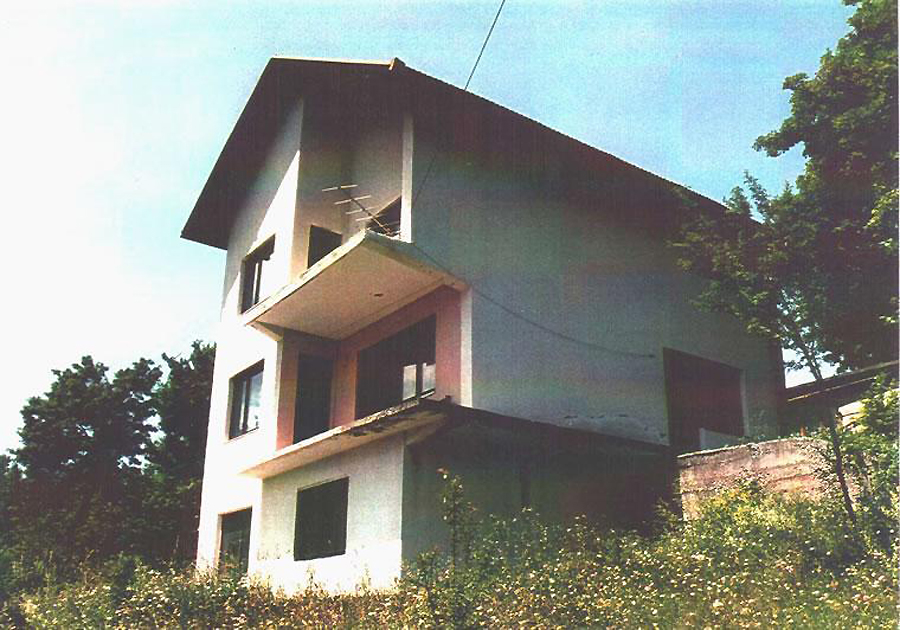
‘Karaman’s House’ is a location where women were tortured and raped near Foča, Bosnia and Herzegovina. Photograph provided courtesy of the ICTY via Wikimedia Commons.
Witch trial
This new edition of The Mortal Sins of Feminism goes beyond the texts included in the original volume, and follows her work through the war and its aftermath in the 1990s. Animosity towards feminists, especially those also voicing anti-nationalist views, took an extreme form in an attack directed at five women intellectuals in the notorious ‘witch trial’ article, published in the Croatian nationalist weekly Globus.
Drakulić was one of the women attacked – ostensibly for her political views, even though the article in fact focused on very private and personal matters. After this, she was forced to stop publishing in the Croatian press for almost a decade, but she never stopped writing or speaking out against nationalism and war, and for women’s rights and feminism.
This book is a way of remembering these two, very different, but most certainly heroic phases of recent history, and of rediscovering writings from the defining decades of Drakulić’s oeuvre. She remains a brave, bright and original storyteller, who never ceases to surprise, to make one laugh and to get one angry. She makes us care and forces us to think. There is a lot to be learnt from this volume, which represents a crucial part of our shared East Central European, and all-European, feminist history.
A version of this article was first published as an introductory essay to Slavenka Drakulić, Smrtni grijesi feminizma [The Mortal Sins of Feminism; Fraktura Publishing House, 2020].
Slavenka Drakulić is a member of Eurozine‘s Advisory Board.
Slavenka Drakulić, Smrtni grijesi feminizma, Znanje, 1984. A new edition of the collection, including essays published 1984-2019 and an introduction by Zsófia Lóránd appeared in 2020: Slavenka Drakulić, Smrtni grijesi feminizma, Fraktura, 2020
Interview with Dunja Blažević, Sarajevo, 30 March 2012. Quotation from Zsófia Lóránd, The Feminist Challenge to the Socialist State in Yugoslavia, Palgrave Macmillan, 2018
Croatian: Konferencija za društvenu aktivnost žena Hrvatske.
Croatian: Žena i društvo.
Croatian: Drug-ca žena. Žensko pitanje – novi pristup?
Croatian: Sociološko društvo.
Croatian: ‘Umjesto biografije’.
Croatian: ‘Dok su moj suprug i naši prijatelji studirali i nastavljali revoluciju, ja sam podizala dijete’.
Croatian: Žena i društvo.
See, for example, work by Anđelka Milić, Žarana Papić, Gordana Cerjan-Letica, Nada Ler-Sofronić and Vesna Pusić.
Lydia Sklevicky did some trailblazing historical work, followed by Andrea Feldman later in the 1980s.
See the work of Rada Iveković and Blaženka Despot.
The reinterpretation of the canon was the collective work of many scholars and curators, from Ingrid Šafranek and Jelena Zuppa to Nada Popović Perišić and Slavica Jakobović, as well as curators such as Dunja Blažević, Biljana Tomić, and Bojana Pejić.
Slavenka Drakulić, Hologrami straha [Holograms of Fear], Grafički Zavod Hrvatske, 1987
Slavenka Drakulić, Mramorna koža [Marble Leather], Grafički zavod Hrvatske, 1989
Croatian: ‘naše se djevojke ne svlače, one su čedne, to čine samo one na trulom Zapadu.’ Quotation from 1Muški su drugo’ [Men are different].
See the essay ‘Dugi rat nage Venere’ [The long war of the naked Venus].
Slavenka Drakulić-Ilić, ‘Žena i seksualna revolucija’ [Woman and the sexual revolution], Dometi, Vol. 2, 13/1980, 45–50, 46
Croatian: ‘Ti isti erotski časopisi koji imaju tako revolucionarne funkciju stvorili su opću euforiju oko tzv. ‘seksualne revolucije’, euforiju u kojoj se od šume ne vidi stablo, stvarajući privid da sveprisutno golo žensko tijelo svjedoči o nekakvu oslobođenju žene. Prema tome, pornografski bi listovi bili glavni poligon za feminizam!’
See the essay ‘Živjeti kao druge žene’ [Living like other women].
Croatian: ‘ponekad se manifestira nasilno i otvoreno, a ponekad suptilno’. Quotation from ‘Muški način mišljenja’ [The male way of thinking].
Essay title in Croatian: ‘Sezona silovanja’.
Published 21 January 2022
Original in English
First published by Smrtni grijesi feminizma [The Mortal Sins of Feminism; Fraktura Publishing House, 2020].
© Zsófia Lóránd / Fraktura Publishing House / Eurozine
PDF/PRINTIn focal points
Newsletter
Subscribe to know what’s worth thinking about.
Related Articles

Women’s rights activists protesting for a democratic Iran counteract armed police on the streets with non-hierarchical leadership, a rhizomatic network, transnationality and flash mobs. Their momentum, supported globally via the Iranian diaspora, also benefits from a legacy of historic feminist action under extreme oppression.

Women forced to leave their homes during war face gender specific dangers. Mobile phones and refugee-targeted apps can be either a lifeline or an unforeseen trap, associated with rape and trafficking. How could the West’s innovative digital response to sexual health and exploitation be improved?
